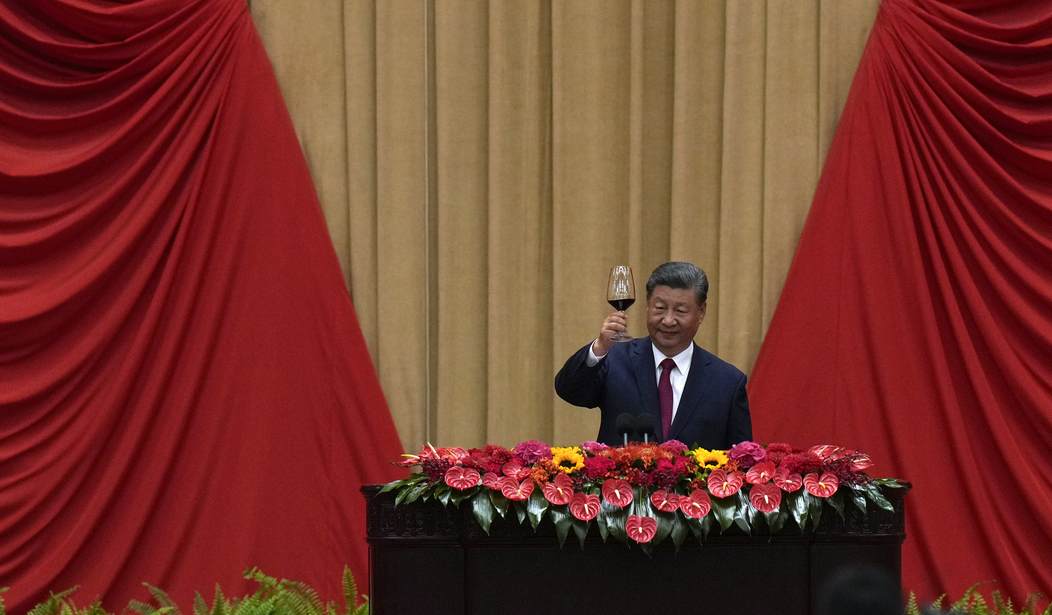When Americans think of threats from Communist China, they often picture fighter jets, hypersonic missiles, and spy balloons drifting through sovereign airspace. But Beijing’s real play for global dominance isn’t always military. It’s digital. It’s economic. And it’s already staring us in the face.
The U.S. has been working for years to remove companies with ties to the Chinese Communist Party from our military supply chains. President Trump banned the Pentagon from using Chinese-made drones back in 2017, and the Defense Department expanded its blacklist of “Chinese Military Companies” in 2024 to include a whopping 134 firms.
But keeping products from the People’s Republic away from our soldiers, sailors, marines, airmen, and guardians just scratches the surface. Beijing is embedding itself in the very systems our society relies on to function—from financial networks to farmland to pharmaceuticals.
Take, for example, the federal investigation into Chinese tech company PAX Global Technology Limited, which began when federal agents raided PAX’s Florida office in 2021.
The company’s payment terminals — which thousands of U.S. retailers and bank branches use — were allegedly transmitting abnormal amounts of data to overseas servers. A Treasury Department spokesperson told Bloomberg their “preliminary assessment is that data transmission by these devices indicates the possibility of risks to customer data confidentiality.”
The former Washington Post reporter and prominent cybersecurity blogger Brian Krebs offers a more detailed explanation. Citing an unnamed “trusted source,” Krebs alleges that “PAX terminals were being used both as a malware ‘dropper’ — a repository for malicious files — and as ‘command-and-control’ locations for staging attacks and collecting information.”
We’ve known this for almost four years. Then, this week, Breitbart broke the news that financier Che Feng, the second-largest shareholder in the firm that owns a controlling interest in PAX, is also a close associate of Hunter Biden who “was instrumental in linking” the former president’s son “to Chinese capital.”
Recommended
So while Americans swipe their cards at checkout, Chinese bad actors may be watching, profiting, and using those ill-gotten gains to buy access to American politicians.
There’s no direct evidence linking the CCP to PAX, but the Chinese government frequently sponsors cyberattacks against U.S. citizens and companies.
Just two months ago, the Justice Department charged two Chinese hackers with “ties to the government of the People’s Republic,” who allegedly “targeted a multitude of U.S. victim companies, municipalities, and organizations for profit, causing millions of dollars’ worth of damages” and “exfiltrated data from numerous U.S.-based technology companies, think tanks, defense contractors, government municipalities.” And the more we rely on China-sourced tech from companies like PAX, the easier it will be for hackers to penetrate our systems.
China isn’t just trying to access American financial systems either. Chinese firms have also been snapping up U.S. farmland for years, often near military bases and sensitive infrastructure. A June 2024 analysis identified plots of Chinese-owned land near 19 bases. Biden belatedly took action a month later, but there’s still plenty of work to be done. In February, Agriculture Secretary Brooke Rollins confirmed that “the Chinese purchase of our farmland” — especially “around some of our military outposts” — was near “the very, very top” of her list of concerns.
China has even wormed its way into our pharmaceutical supply chains, a lesson we all learned the hard way during COVID. According to the U.S.–China Economic and Security Review Commission, the U.S. is “heavily dependent on drugs that are either sourced from China or include [ingredients] sourced from China.” If tensions escalate, Beijing could squeeze our supply of lifesaving drugs with a single export restriction.
Thankfully, the Trump administration is fighting back. On February 21, he announced his “America First Investment Policy.” This directive aims to protect U.S. national security by curbing Chinese investments in strategic sectors, including not just technology and financial systems, but also infrastructure, healthcare, agriculture, energy, and raw materials.
During the Biden administration, Rollins worked at the America First Policy Institute, where she helped craft state legislation banning Chinese farmland purchases. Now that she’s been confirmed to her cabinet post, she says she’s “looking at a federal solution too.”
Trump has already called for reshoring pharmaceutical manufacturing, using tax incentives and defense authorities to bring production back to American soil. On May 5, he signed an executive order directing the Food and Drug Administration (FDA) “to reduce the amount of time it takes to approve domestic pharmaceutical manufacturing plants by eliminating duplicative and unnecessary requirements, streamlining reviews, and working with domestic manufacturers.” Pharma giant Bristol Myers Squibb has already announced a $40 billion investment to expand its footprint in the U.S.
The CCP isn’t just building ships, planes, and missiles (though it’s building a lot of those too). It’s also buying silence, embedding influence, stealing our data, and infiltrating our critical systems and supply chains. And too many U.S. elites, including some in Biden’s orbit, have been willing to look the other way.
President Trump understands that a sovereign nation cannot outsource its security, its land, or its health to a communist adversary. That’s why his second-term agenda is focused on strategic decoupling—cutting the cord on Chinese control, before it’s too late.
This isn’t just about decoupling; it’s about survival. And Trump is the only leader treating it like what it is — a war for America’s future.
Col. Robert L. Maness (Ret), host of The Rob Maness Show, is a 32-year United States Air Force combat veteran, where he served as commander of the 377th Air Base Wing, Kirtland Air Force Base. He was a member of the Trump Campaign’s Veterans and Military Families for Trump Coalition. Follow him on X @RobManess.

























Join the conversation as a VIP Member